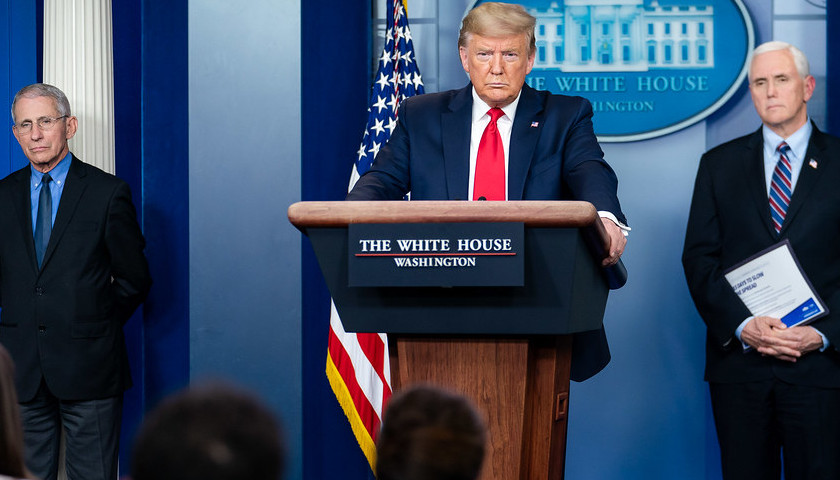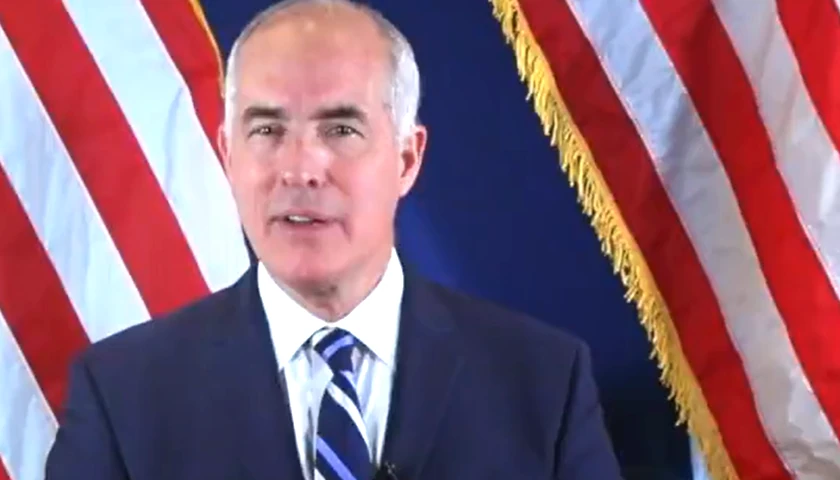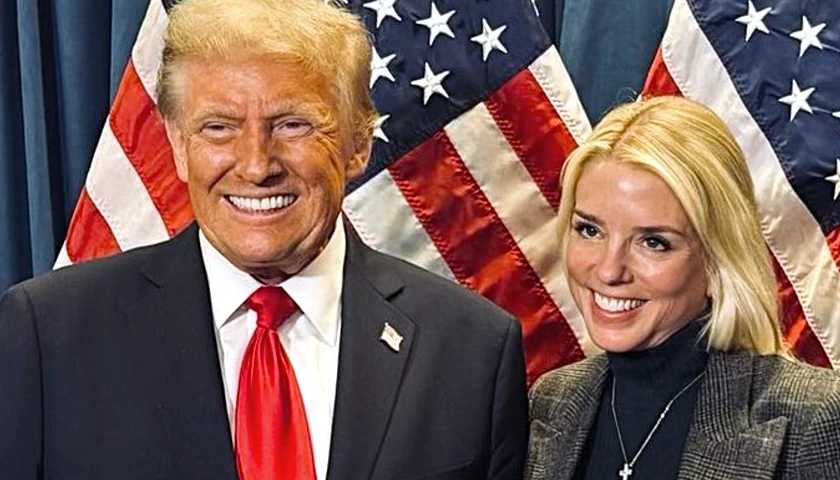by Conrad Black
President Trump has met and passed his supreme test. This has left his Democratic opponents desperately espousing gloom and demanding that the economic shut-down continue, according to frequent semi-high-brow Democratic ideologue and former Labor Secretary Robert Reich, for up to seven months.
Clinton Treasury Secretary Larry Summers took to the Washington Post to preach epidemiological defeatism. While the choristers of fear and despair are clinging to a prolonged economic melt-down like drowning men clutching a raft, their presumptive presidential candidate is disintegrating in the midst of friendly interviews and struggling to get a little attention while the man he wishes to unseat takes one to two hours of prime-time television every day announcing the success of his plan of action to deal with the country’s greatest public health crisis in a century.
When Trump realized that his breezy assurances that everything was under control and that the spring weather would vanquish the problem weren’t cutting it, and that he was wide open to blistering criticism from his opponents, he imperturbably executed a 180-degree turn and became, in FDR’s phrase, apt for a public health crisis, “Dr. Win-the-War.”
The Democratic Party spokespeople for a few days were feeling very sufficient, settling into a long siege with the entire economy of the country descending into desperate straits, and then carrying their recently resurrected nominee, the ill-assured and quavering Joe Biden across the finish-line against the new Herbert Hoover.
Democrats had been incredulous at Trump’s appearance as a candidate, judged him unelectable, were so astonished by his victory they convinced themselves and corrupted the Justice Department and the intelligence agencies with the monstrous falsehood that he had won by enlisting the support of the Kremlin. And when that enormous canard came down in flames—like the Hindenburg at Lakehurst, New Jersey in 1937—out of terror-induced distraction, they impeached him for unimpeachable offenses and with no believable evidence that he had committed them anyway.
The unelectable Trump had given way to the impeachable Trump, who was replaced by the distinctly beatable Trump, a vision it was increasingly hard to believe in as the economy disobediently boomed and the president’s poll numbers rose. Then, like the Seventh Cavalry guided by a beatific apparition, the coronavirus pandemic descended. It wasn’t quite the Trump exit his enemies had wished, but it would do and it was providential. Trump would shut everything down after being pilloried for overconfidence and ineffectiveness, the economy would wither, the pandemic would do to him politically what the Iran hostages did to Jimmy Carter, and the Democrats could claim in the autumn that if he had just acted more quickly, all would be well, and the disease-driven poverty of America was Trump’s doing.
The president had the grace of conversion. He shut down all the bunk about his philistine animosity to science by recruiting a blue-ribbon scientific and public health administrative team. He stopped most of the Democratic officeholders by cooperating closely with all the governors, including some he had quarreled with publicly and acidulously. People in the front lines, like New York Governor Andrew Cuomo and California Governor Gavin Newsom, were fighting for the lives of the people in their states, as well as for their own political futures, and all those who were trying to cope with the pandemic, rather than exploiting its political consequences, had the same interest.
The eminent scientists and other specialists on the president’s task force appeared with him at his press briefings and spoke in solidarity with him. Trump more or less shouldered the vice president aside and took the podium every day with the whole country watching. He brought in the private-sector leaders and a collaboration somewhat reminiscent of the brilliant cooperation between government and industry in World War II instantly came into being as many corporations threw their energies into producing and distributing vital equipment for combating the scourge.
Medical supplies were moved quickly and with almost no red tape. The astounding incapacity to test in serious numbers and promptly was replaced in two weeks with mass testing that almost anyone could perform with results coming in 40 minutes. This week there have been 65,000 tests a day and by next week there will be 150,000 tests a day.
Trump was solid, not rattled, by the questions and entirely believable as he handled the press every day, and fully corroborated by his experts. The anticipated fatality rate between 5 and 10 percent of those afflicted, and a majority of those apparently with coronavirus symptoms, narrowed out after about 10 days and it emerged that only about 15 percent of those who seemed to have the symptoms tested positive, and of those, fatalities were about 1.5 percent of infected people.
If the immuno-compromised portion of the population could be segregated and protected, the fatality rate came down to about half of 1 percent of the 15 percent of the tested and symptomatic people who actually had contracted the coronavirus. And there are large regions of the country where the penetration of the virus has been minimal, and this condition was generally conserved by drastically reduced travel.
The independent medical and epidemiological experts confirmed that the president’s actions in closing down flights from China in January and from Western Europe on March 11 had undoubtedly saved many American lives and that without these measures, the United States could have had fatality rates like Italy’s distressing 10.5 percent of infected cases—scores or even hundreds of thousands of dead if replicated in the United States. At the time of the move on flights from China, Democratic Senate leader Chuck Schumer fired the usual Democratic charges of “racism” and “xenophobia” at the president—the charges didn’t wear well.
The president championed the malarial remedy Hydroxychloroquine, and when one unfortunate tried to self-medicate but with the phosphate version (an aquarium tank-cleaner) he died so CNN billed it a virtual manslaughter by the president. Laughable. And the actual remedy does appear to be promising. As this new and less terrifying picture emerged, a rising focus among commentators was on the economic damage of a prolonged shut-down of the country.
Although this was essentially what the Democrats were counting on, they had to concur in the president’s relief package, an awe-inspiring two trillion dollar direct relief bill supplemented by a four trillion dollar liquidity facility. The Democrats squandered their ability to take much credit for it by trying to pack in nonsense about solar panels, windmills, abortions, carbon emissions of grounded airliners, and back-handers for trade unions. Too late. They realized that Trump and the treasury secretary, Steve Mnuchin, had layered in tax benefits that would outlast the public health crisis and its consequences and would be of tangible pleasure to the voters as they went to their election places.
And so the Democrats arrive at their last line of defense: Bill de Blasio, the failed, lame-duck mayor of New York, pathetically wailing for the deployment of the armed forces (for no evident purpose and as if they were immune to the virus) and predicting that the pandemic would rage everywhere in the country at the highest New York City rate, for six months. Reich and Summers and the others charged out of the firehall one more time demanding a long shutdown, but it won’t fly. They’ve run out of dirty tricks they’re finished.
The Democrats have a presumptive candidate who can hardly utter a coherent sentence in response to a friendly questioner, live-streaming from a little podium in his living room, an absurd, and objectively sad spectacle. The Democratic bosses are sending an infirm and elderly mouse to bell a big, tawny, roaring cat. Anyone can see how it will end.
– – –
Conrad Black has been one of Canada’s most prominent financiers for 40 years, and was one of the leading newspaper publishers in the world as owner of the British telegraph newspapers, the Fairfax newspapers in Australia, the Jerusalem Post, Chicago Sun-Times and scores of smaller newspapers in the U.S., and most of the daily newspapers in Canada. He is the author of authoritative biographies of Franklin D. Roosevelt and Richard Nixon, one-volume histories of the United States and Canada, and most recently of Donald J. Trump: A President Like No Other. He is a member of the British House of Lords as Lord Black of Crossharbour.




